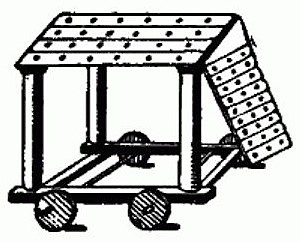In many European languages, the word for mouse [see note 1] also had or has the sense of muscle of the body, especially of the upper arm, from the resemblance of a flexing muscle to the movements made by a mouse.
In classical Latin in particular, muscŭlus, literally a little mouse, a little rat, also denoted a muscle of the body. (Via Middle French muscle, the English noun muscle is from Latin muscŭlus.)
Latin muscŭlus was a diminutive of mūs, a mouse, a rat, in turn cognate with ancient Greek μῦς (= mũs), literally a mouse, also a muscle of the body.
In Middle French, the word for mouse, souris (also souriz, sorriz), was also used to denote the fleshy part of the arm or of the leg. In Modern French, souris [see note 2] is still also used to designate the fleshy muscle at the end of a leg of lamb (cf. the regional use of English mouse to denote any of various parts of pork- or beef-meat rich in muscle tissue).
In classical Latin, muscŭlus was also used in the sense of mussel. The English noun mussel and the French feminine noun moule are both ultimately derived from muscŭlus in the sense of mussel—cf. also German Muschel and Dutch mossel.
Latin muscŭlus was also a military term denoting a moveable shed used to protect assailants:

muscŭlus – from Dictionnaire illustré latin-français (1934), by Félix Gaffiot
Notes:
1. Of Germanic origin, the English word mouse is related, for example, to German Maus and Dutch muis. These Germanic words are cognate with Sanskrit mūṣ, ancient Greek μῦς, classical Latin mūs, Armenian mowkn, Old Church Slavonic myšĭ and Russian myš′.
2. French souris, mouse, is from an unattested popular Latin form soricem, from classical Latin sōrex/sorĭcis, mouse.
